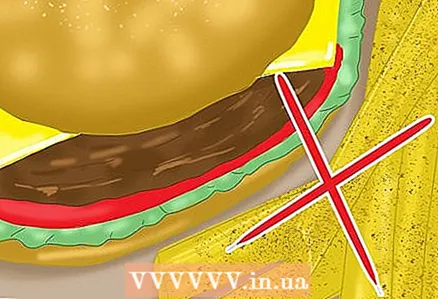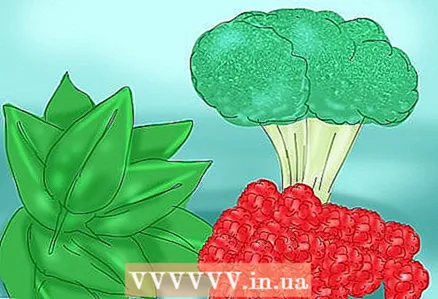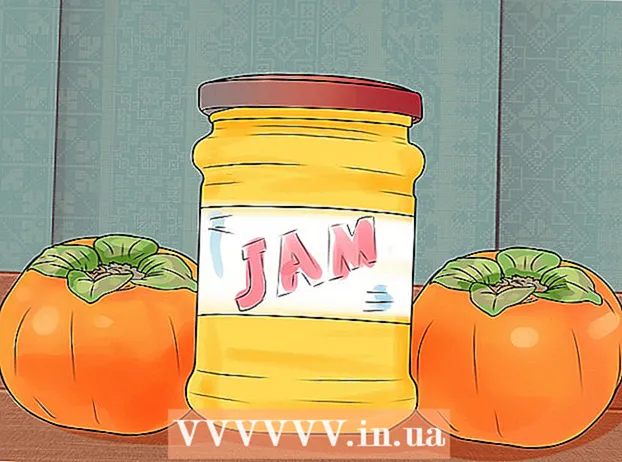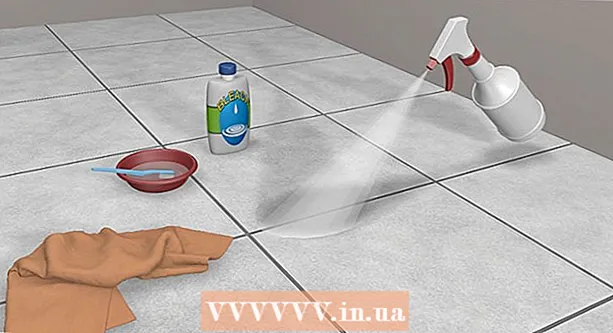Author:
Bobbie Johnson
Date Of Creation:
7 April 2021
Update Date:
1 July 2024

Content
- Steps
- Method 1 of 3: Treating Different Types of Kidney Stones
- Method 2 of 3: How to Prevent Kidney Stones by Changing Your Diet
- Method 3 of 3: How to Prevent Kidney Stones with Medication and Surgery
- Tips
Kidney stones are hard crystals of minerals and acidic salts that form in the kidneys. When they get too big, they can no longer come out and cause severe pain. If you have already encountered this problem in the past, then you probably would like to know how to prevent it, because the probability of their recurrence is 60-80%.
Attention:the information in this article is for informational purposes only. Before using any methods, consult your doctor.
Steps
Method 1 of 3: Treating Different Types of Kidney Stones
 1 Determine what kind of kidney stones you have. Ask your doctor to determine their type. This information is essential for taking the necessary measures to prevent their recurrence. Ask your doctor to check your parathyroid gland to exclude it as a factor in kidney stones.
1 Determine what kind of kidney stones you have. Ask your doctor to determine their type. This information is essential for taking the necessary measures to prevent their recurrence. Ask your doctor to check your parathyroid gland to exclude it as a factor in kidney stones. - Calcium stones are formed from unused calcium that is not excreted in the urine and accumulates in the kidneys. Then it combines with other waste products of the body and turns into stones. The most common calcium stones are calcium oxalates. Phosphate stones are less common, but they pose more problems as they are usually larger and harder, making treatment more difficult.
- Struvite stones can appear after a urinary tract infection. They are composed of magnesium and ammonia.
- Uric acid stones are formed due to excess uric acid in the body. Reduce the amount of meat in your diet to stop these stones from forming. Symptoms are often associated with gout and are treated with similar treatments.
- Cystine stones are rare and tend to be hereditary. Cystine is an amino acid and some people inherit high levels of it.
 2 Identify possible risks. Because you already have kidney stones, the likelihood of their recurrence increases. Make sure you are aware of all risk factors. Use online resources to assess your risk of kidney stones recurrence, and discuss risk factors with your doctor.
2 Identify possible risks. Because you already have kidney stones, the likelihood of their recurrence increases. Make sure you are aware of all risk factors. Use online resources to assess your risk of kidney stones recurrence, and discuss risk factors with your doctor.  3 Consult your doctor. Based on the type of stones you have, your age, gender, and family history, your doctor can help you develop a plan to reduce the chances of your kidney stones coming back. Typically, the plan includes dietary changes, increased fluid intake, and in very specific cases, medication and even surgery.
3 Consult your doctor. Based on the type of stones you have, your age, gender, and family history, your doctor can help you develop a plan to reduce the chances of your kidney stones coming back. Typically, the plan includes dietary changes, increased fluid intake, and in very specific cases, medication and even surgery.
Method 2 of 3: How to Prevent Kidney Stones by Changing Your Diet
 1 Drink plenty of fluids. The fluids will help flush substances that cause kidney stones from the body. Water copes with this task as well as possible. It will allow you to flush the kidneys and not add anything unnecessary to them: neither sugar, nor sodium, nor any other substances that are present in other drinks. Drink at least 10 glasses (2.4 L) of water daily. Avoid caffeinated drinks (and other diuretics), as they do not saturate the body with water, but only drain it. It is necessary to remove from the body two or more liters of urine per day, the color of which should range from completely transparent to slightly yellowish.
1 Drink plenty of fluids. The fluids will help flush substances that cause kidney stones from the body. Water copes with this task as well as possible. It will allow you to flush the kidneys and not add anything unnecessary to them: neither sugar, nor sodium, nor any other substances that are present in other drinks. Drink at least 10 glasses (2.4 L) of water daily. Avoid caffeinated drinks (and other diuretics), as they do not saturate the body with water, but only drain it. It is necessary to remove from the body two or more liters of urine per day, the color of which should range from completely transparent to slightly yellowish.  2 Give up salt. One of the main causes of kidney stones is concentrated urine. Salt leads to dehydration, resulting in concentrated urine. If you do eat anything salty, neutralize the salt by drinking a large glass of water.
2 Give up salt. One of the main causes of kidney stones is concentrated urine. Salt leads to dehydration, resulting in concentrated urine. If you do eat anything salty, neutralize the salt by drinking a large glass of water.  3 Eat less meat. Animal proteins can lead to concentrated urine, one of the risk factors for kidney stones. Waste protein ends up in the urine and can increase the likelihood of kidney stones.
3 Eat less meat. Animal proteins can lead to concentrated urine, one of the risk factors for kidney stones. Waste protein ends up in the urine and can increase the likelihood of kidney stones.  4 Consume more fiber. Some studies indicate that insoluble fiber combines with calcium in the urine and is excreted in the feces. This helps to reduce the amount of calcium in the urine. Good sources of fiber are:
4 Consume more fiber. Some studies indicate that insoluble fiber combines with calcium in the urine and is excreted in the feces. This helps to reduce the amount of calcium in the urine. Good sources of fiber are: - Whole grains like oatmeal, bran, and quinoa
- prunes and prune juice;
- leafy greens such as spinach, Swiss chard, or kale.
 5 Be careful with your oxalate intake if you have experienced calcium oxalate stone formation. To avoid this problem, consume calcium and oxalates together. So they can unite in the stomach instead of going to the kidney and turning into stone.
5 Be careful with your oxalate intake if you have experienced calcium oxalate stone formation. To avoid this problem, consume calcium and oxalates together. So they can unite in the stomach instead of going to the kidney and turning into stone. - Spinach, chocolate, beets and rhubarb are rich in oxalate. Oxalate is also found in beans, green peppers, tea, and peanuts.
- Good sources of calcium that can be combined with oxalate foods are milk, cheese, calcium-fortified orange juice, and yogurt.
Method 3 of 3: How to Prevent Kidney Stones with Medication and Surgery
 1 Take medication for kidney stones. Usually, doctors prescribe thiazide diuretics or phosphate-containing drugs. Hydrochlorothiazide (a thiazide diuretic) can reduce the amount of calcium excreted in the urine by keeping it in the bones and reduce the likelihood of calcium stones forming. This drug works best when you also reduce your salt intake.
1 Take medication for kidney stones. Usually, doctors prescribe thiazide diuretics or phosphate-containing drugs. Hydrochlorothiazide (a thiazide diuretic) can reduce the amount of calcium excreted in the urine by keeping it in the bones and reduce the likelihood of calcium stones forming. This drug works best when you also reduce your salt intake.  2 Ask your doctor to prescribe medicine for you to relieve the symptoms of uric acid stones. Allopurinol helps maintain urine alkalinity levels and reduces uric acid levels in the blood and urine. Allopurinol and an alkylating agent are sometimes combined to completely dissolve uric acid stones.
2 Ask your doctor to prescribe medicine for you to relieve the symptoms of uric acid stones. Allopurinol helps maintain urine alkalinity levels and reduces uric acid levels in the blood and urine. Allopurinol and an alkylating agent are sometimes combined to completely dissolve uric acid stones.  3 Take antibiotics if you have struvite stones. A short course of antibiotics will prevent bacteria from forming in the urine, which leads to struvite stones. As a rule, doctors advise against taking antibiotics for a long time, but a short course will significantly improve your situation.
3 Take antibiotics if you have struvite stones. A short course of antibiotics will prevent bacteria from forming in the urine, which leads to struvite stones. As a rule, doctors advise against taking antibiotics for a long time, but a short course will significantly improve your situation.  4 Reduce cystine stones by increasing urine alkalinity. Typically, this method of treatment involves the use of a catheter and the introduction of alkalizing substances into the kidneys. Cystine stones usually respond well to this treatment, especially if it is accompanied by drinking a lot of water (both day and night).
4 Reduce cystine stones by increasing urine alkalinity. Typically, this method of treatment involves the use of a catheter and the introduction of alkalizing substances into the kidneys. Cystine stones usually respond well to this treatment, especially if it is accompanied by drinking a lot of water (both day and night).  5 Prevent the formation of calcium stones through surgery. Surgery is only necessary if you have hyperparathyroidism or if the cause of kidney stones is in the parathyroid gland. Having this disorder can lead to calcium kidney stones. As a rule, removing one or two parathyroid glands in the neck can heal the condition and eliminate the possibility of kidney stones.
5 Prevent the formation of calcium stones through surgery. Surgery is only necessary if you have hyperparathyroidism or if the cause of kidney stones is in the parathyroid gland. Having this disorder can lead to calcium kidney stones. As a rule, removing one or two parathyroid glands in the neck can heal the condition and eliminate the possibility of kidney stones.
Tips
- Sometimes it can be difficult to know which kidney stones you have had before. The stones could not come out or come out without leaving a trace, or the statement about the treatment performed could simply be lost. However, kidney stones can still be cured. Treatment will simply be less targeted and therefore less effective.



